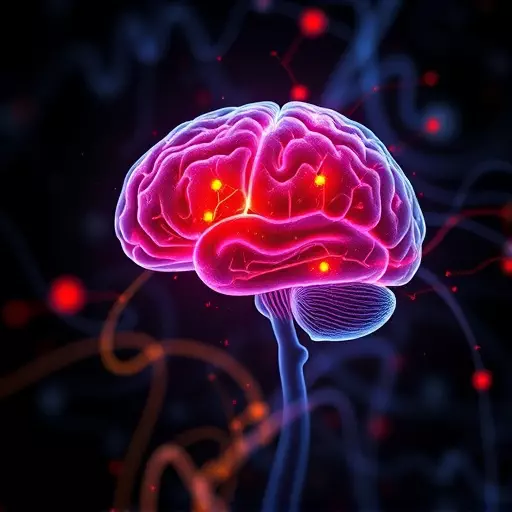Functional medicine practitioners in Cincinnati offer a holistic approach to treating depression by addressing neuroinflammation and oxidative stress. Recent research highlights the connection between brain inflammation and mental illness, prompting functional medicine experts to focus on root causes like diet, gut health, and environmental toxins. They employ strategies such as dietary interventions with anti-inflammatory foods, exercise, stress management, and mindfulness practices to reduce neuroinflammation, optimize brain function, and improve mental well-being outcomes for individuals in Cincinnati and beyond.
Mental health conditions often intersect with oxidative stress, a state where the body’s natural balance of free radicals and antioxidants is disrupted. This introduction explores neuroinflammation’s pivotal role in mental disorders, highlighting its impact on brain function and mental well-being. We delve into how functional medicine in Cincinnati offers innovative solutions, addressing oxidative stress through tailored approaches. Learn about practical strategies targeting depression, emphasizing lifestyle changes to mitigate symptoms and enhance overall mental health.
- Understanding Oxidative Stress and Its Impact on Mental Health
- The Link Between Neuroinflammation and Mental Disorders
- Functional Medicine Approach to Addressing Oxidative Stress in Cincinnati
- Practical Strategies for Overcoming Depression through Functionality
- Integrating Lifestyle Changes for Optimal Mental Well-being
Understanding Oxidative Stress and Its Impact on Mental Health

Oxidative stress occurs when an imbalance between free radicals and antioxidants disrupts the body’s natural equilibrium. Free radicals, unstable molecules produced by normal bodily functions and environmental factors like pollution, can damage cells and DNA. In mental health conditions, such as depression, neuroinflammation—an immune response in the brain—can exacerbate oxidative stress. This inflammation triggers the release of reactive oxygen species, further contributing to neuronal damage and impaired brain function.
Functional medicine practitioners in Cincinnati recognize the profound impact of this process on mental well-being. By addressing underlying causes, including diet, gut health, and environmental toxins, functional strategies for overcoming depression can be tailored. These approaches focus not just on managing symptoms but on restoring balance within the body, targeting both oxidative stress and neuroinflammation to promote improved mental health outcomes.
The Link Between Neuroinflammation and Mental Disorders

In recent years, researchers have been exploring a compelling connection between neuroinflammation and various mental health conditions, shedding light on potential underlying causes of disorders like depression. Functional medicine practitioners in Cincinnati and beyond are taking note, as this growing body of evidence suggests that chronic inflammation in the brain could play a significant role in the development and exacerbation of mental illness. Neuroinflammation, characterized by an activation of immune cells and increased production of pro-inflammatory cytokines, has been linked to structural and functional changes in the brain, including alterations in neurotransmitter systems and neural circuits.
These discoveries open up new avenues for understanding and treating mental health disorders from a functional medicine perspective. By focusing on strategies that target neuroinflammation, such as dietary interventions, stress management techniques, and targeted supplementation, practitioners aim to provide more holistic solutions for their patients dealing with depression and other mental health challenges. Functional strategies for overcoming depression move beyond symptom management, aiming to address the root causes by supporting brain health and promoting a balanced inflammatory response.
Functional Medicine Approach to Addressing Oxidative Stress in Cincinnati

In Cincinnati, a growing number of healthcare practitioners are adopting a Functional Medicine approach to address oxidative stress and neuroinflammation in mental health conditions. This holistic perspective recognizes that mental well-being is intricately linked to the intricate interplay between the brain, gut, and immune system. By focusing on the root causes rather than merely treating symptoms, functional medicine seeks to restore balance and optimize overall functioning.
Functional strategies for overcoming depression, for instance, may involve targeting neuroinflammation, which has been implicated in various mental health disorders. This can be achieved through a combination of dietary interventions, such as increasing anti-inflammatory foods like omega-3 fatty acids and curcumin, along with stress management techniques and environmental modifications. These approaches aim to mitigate oxidative stress, reduce inflammation, and support the brain’s resilience, ultimately paving the way for improved mental health outcomes in Cincinnati and beyond.
Practical Strategies for Overcoming Depression through Functionality

In the context of functional medicine in Cincinnati, understanding the connection between neuroinflammation and mental health disorders is paramount. Neuroinflammation’s role in conditions like depression cannot be understated; it’s a key driver behind symptoms and progression. However, hope lies in practical strategies for overcoming depression that target this underlying process.
Functional strategies focus on addressing root causes rather than merely managing symptoms. This involves dietary interventions aimed at reducing pro-inflammatory foods and increasing anti-inflammatory nutrients, regular exercise to mitigate neuroinflammation and boost neurotransmitters, and stress management techniques such as mindfulness meditation and yoga. Additionally, functional medicine in Cincinnati emphasizes the importance of high-quality sleep, which plays a crucial role in regulating mood and reducing inflammation. By adopting these functional strategies, individuals can take control of their mental health journey and foster resilience against depression.
Integrating Lifestyle Changes for Optimal Mental Well-being

In addressing oxidative stress and its link to mental health conditions like depression, integrating functional medicine approaches becomes paramount. A key aspect is adopting lifestyle changes that target neuroinflammation, a significant contributor to mental health disorders. Functional medicine in Cincinnati and beyond offers strategies tailored to individual needs. These may include dietary modifications to incorporate anti-inflammatory foods, regular exercise to boost neurotransmitters and reduce stress hormones, and mindfulness practices to mitigate the impact of oxidative stress on brain health.
By embracing these functional strategies for overcoming depression, individuals can foster optimal mental well-being. It’s about a holistic approach that acknowledges the intricate relationship between physical health, gut microbiome, and mental state. Through these lifestyle interventions, individuals can not only manage symptoms but also enhance their overall resilience to oxidative stress, potentially preventing the progression of mental health disorders.
